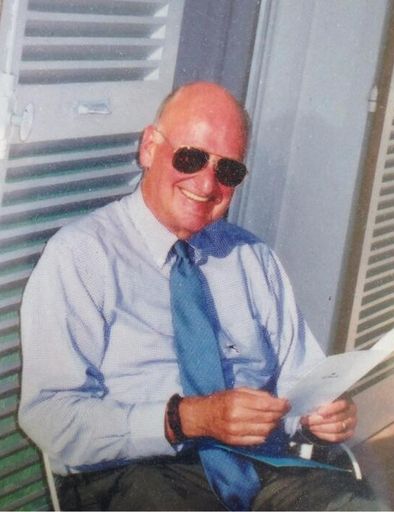

John M. Otter Iii
November 26, 1930 — October 23, 2024
Granville
Jack Otter, a former vice-president of NBC Television who was instrumental in expanding programming and creating specials in the late 1960s, died on Oct. 23 at Select Specialty Hospital in Newark, Ohio. Mr. Otter, a resident of Granville, OH, was 93.
Mr. Otter worked for the National Broadcasting Company from 1953 to 1973. He joined the sales department in 1959, and in 1962 he was named Director of National Sales. Under his leadership, the sales department emphasized a move into “specials,” including news magazines, sporting events and entertainment shows featuring stars such as Julie Andrews, Bing Crosby, Bob Hope, and Diana Ross. Under the slogan, “If it’s really special, it’s on NBC,” the network aired more than 100 such programs in the 1969-’70 season, including First Tuesday, a monthly television magazine created by Mr. Otter.
Mr. Otter, who graduated from Cornell University in 1953, spent his entire career in the media industry. After directing musicals and plays in college, he headed to New York City to pursue a life in show business. He started at NBC in 1953 as a page at Rockefeller Center and an assistant on the Armstrong Circle Theatre television series. After two years as commercial producer of the Arlene Francis Home show, he moved to Today, where he served as “the youngest associate producer in the business,” according to the Baltimore Post. As acting executive producer under Dave Garroway, his adventures included spotting Harry Truman out of the ground-floor studio at Rock Center and running out to ask the former president to come in and “chat with Dave” (Truman declined), negotiating with Baltimore Mayor Tom D'Alesandro Jr., father of Nancy Pelosi, to film a segment in the city, and producing live-to-tape trans-Atlantic broadcasts on art and culture in Paris, featuring interviews with Brigitte Bardot, which were edited on site and flown back to New York to be aired the next morning. As an enlisted man in the Naval Air Reserve, Mr. Otter saw an opportunity for synergies with his day job, creating what the Navy Times called “gigantic amounts of publicity.” Among other things, he arranged an officer’s appearance on the Tonight show, booked the Blue Angels on Today, and produced and directed a segment in which J. Fred Muggs, the chimpanzee on Today, underwent two weeks of boot camp.
He loved to tell stories from those days, including the early morning when Mr. Garroway refused to leave the men’s room as broadcast time approached. The young producer was sent to retrieve the host, who told him that he could not go on the air, because “they” had sent him a message. “They” turned out to be poltergeists, who had turned the anchor’s boxer shorts around. Mr. Otter convinced Mr. Garroway to return the shorts to their proper position, take the anchor’s seat, and then check his boxers during a commercial break to be sure he had not incurred poltergeist wrath by going on the air. The show went on.
After moving upstairs at 30 Rock to the sales division, Mr. Otter negotiated with sponsors, created programming and continued the push into specials. He was part of a vocal contingent urging the network to broadcast entirely in color, an expensive proposition – and risky, at a time when only 6% of homes had a color television. But the investment was justified in part because it would help parent company RCA sell television sets. In 1966 NBC announced an all-color prime time, ahead of competitors CBS and ABC. Among other industry roles, Mr. Otter served as chairman of the Broadcast Networks and Programming Committee of The American Association of Advertising Agencies.
In 1973 he left NBC and consulted for WNET public television before jumping to the agency side as senior vice president and director of programming at SSC&B. In many ways it was the other side of the same coin – the NY Times reported in 1976 that Sunshine Brands would sponsor its first special, an NBC original titled The First Easter Rabbit. “Interestingly enough,” the paper reported, “the buy was made by Jack Otter, former head of sales for NBCTV.” His devotion to his team’s clients extended to the pantry at home – to his sons’ dismay, Hydrox temporarily replaced Oreos as the cookie of choice in the Otter household.
In 1985 he joined McCann Erikson as senior vice president, director of national broadcast, just in time to learn that one of the largest clients, Coca-Cola, was planning to launch a campaign promoting a new formula for its century-old brand. It was too late to avoid the blunder, but Mr. Otter was among many urging the client to backtrack, which it did 79 days later, launching “Classic Coke.” And though he spent a lot of long days and weekends smoothing relations with the giant soft drink maker, McCann kept the account for another 18 years.
John Martin Otter III was born in Pottsville, PA on November 26, 1930, to John M. Otter and the former Ruth Knipe. Though he lacked a college education, John Sr, also known as Jack, worked his way from district salesman for Philco Corporation to executive vice president of the pioneering manufacturer of radios, other electronics, and later televisions. As his son’s own undistinguished high school career was nearing completion, he sent him to a post-graduate year at Lawrenceville preparatory school to improve the odds of getting into college. The strategy paid off, and in addition to a degree, Jack Jr. left Cornell with lifelong friends from his DKE fraternity.
In May, 1960, he married the former Susan Morgan Eaves, a relationship that thrived for 64 years and produced two sons, John Otter IV and Robert Marshall Otter, named for Susan’s father. In 1967, Bruce Johnson, one of the fraternity brothers, convinced Susan and Jack to take their young son to Block Island, a tear-drop of hills, ponds, and sand off Rhode Island. That started a family tradition that continues to this day, and all five grandchildren now consider the island their favorite place on Earth.
Mr. Otter was a devout Episcopalian, and for much of his time in New York a member of St. James Church, where he served on the vestry from 1986-1992. In the fall, Sunday afternoons following church were equally reverent, if less spiritual. The suit and tie were replaced with warm layers, and Jack, Susan, along with friends or clients – or if it was really cold, their sons – would get on the 7 train and head to Shea Stadium to see the New York Jets. Mr. Otter had season tickets from 1964, when the Titans were renamed the Jets, until a few years after the team moved its home games to New Jersey. With the help of his NBC credentials, he was on the sidelines in Florida in 1969 when Joe Namath led the Jets to an upset of the Colts in Superbowl III.
In the late 1980s and early ‘90s, the couple plotted their next chapter, which would take them to Skidaway Island in Savannah, GA. They spent years designing their dream house with pencils and a yellow pad, and in 1994 they left the Upper East Side for the low country, where they spent 25 years in a state their sons referred to as the “no wake zone.” In 2019, they downsized to Granville, OH to be closer to their son Bob.
In addition to his wife and two sons and their wives, Diane Davis Otter and Lee Mutzig Otter, he is survived by a brother, Richard Otter of Anderson, SC, five grandchildren: Lily, John M. and Penelope of New York, and Caroline and Bobby of Granville. In lieu of flowers, donations in his memory are suggested to the Block Island Conservancy.
A family memorial service is planned for 10:00 AM, Friday, November 29, at St. Luke’s Church, 107 E. Broadway Street, Granville, Ohio 43023.
McPeek Hoekstra Hoskinson Funeral Home is honored to care for Jack and his family. Please visit www.McPeekHoekstra.com to share a special memory or leave a message of condolence.
Block Island Conservancy
Web:
https://biconservancy.app.neoncrm.com/np/clients/biconservancy/donation.jsp
Service Schedule
Past Services
Memorial Service
Friday, November 29, 2024
Starts at 10:00 am (Eastern time)
St. Lukes Episcopal Church (Broadway Street, Ohio)
Photo Gallery
Guestbook
Visits: 6
This site is protected by reCAPTCHA and the
Google Privacy Policy and Terms of Service apply.
Service map data © OpenStreetMap contributors



